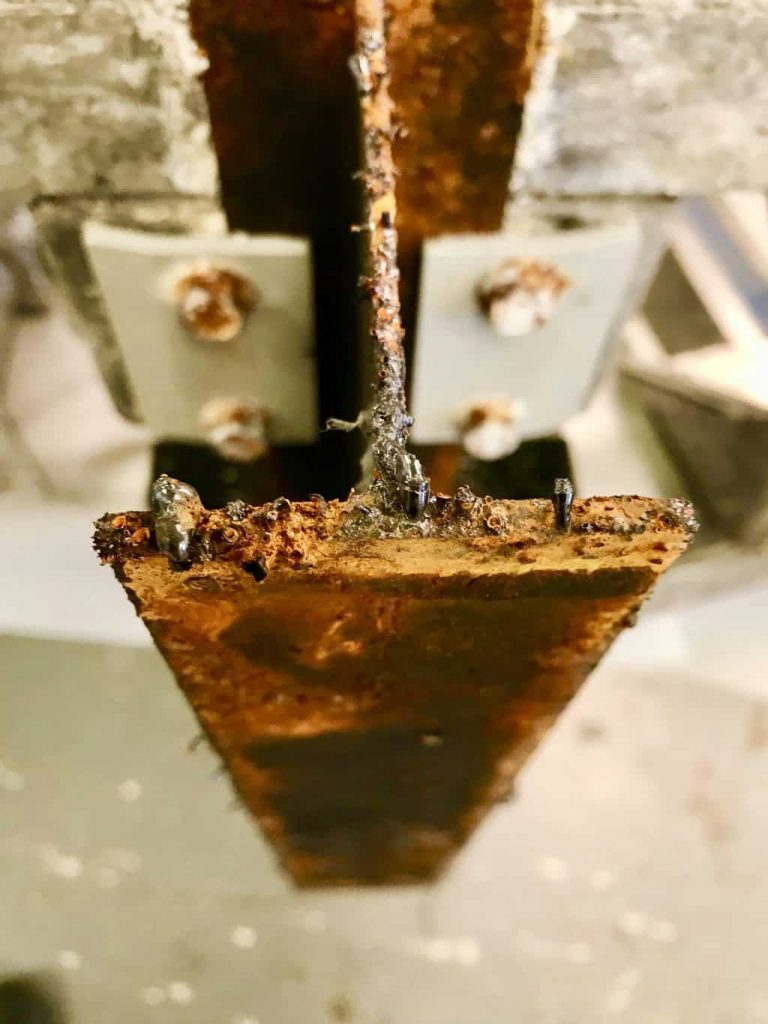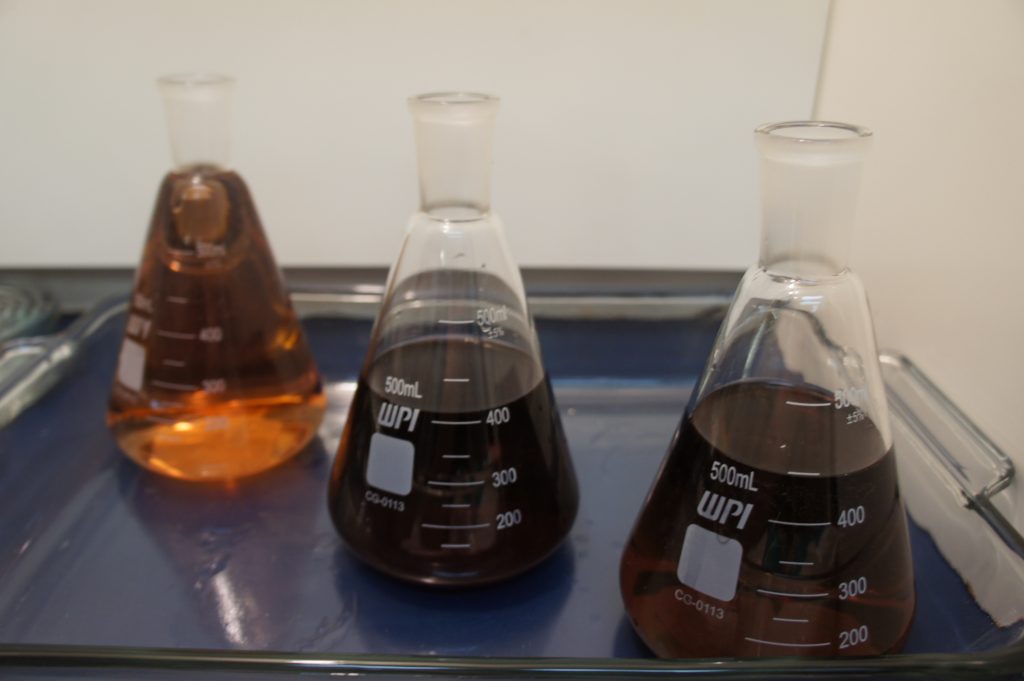Corrosion is an enormous challenge to the global economy. In fact, its cost is over $1 trillion annually in the US (more than 6% of the US GDP by some estimates). Our corrosion testing services help you find and prevent expensive corrosion-related losses before they occur. Both laboratory and on-site testing capabilities let us help address all corrosion issues.

Our team is a leader in the battle against corrosion. We provide a wide range of corrosion testing and consulting services. If you need help now, please get in touch:
What are Common Corrosion Tests?
An enormous amount of corrosion tests have been developed over time – there is something for almost every common (and rare) application. We provide a wide range of corrosion testing to help identify and evaluate how susceptible your materials are to environmental corrosion. The most common tests include:
- pitting,
- salt fog,
- sensitization,
- hydrogen embrittlement,
- stress corrosion,
- fatigue,
- galvanic, and
- uniform corrosion.
Our corrosion experts have dealt with many of these corrosion tests, which helps us advise you on the most appropriate methods for your application.
What Type of Corrosion Tests Are Available?
ASTM, NACE/AMPP, ISO, and custom corrosion tests are all commonly used – the choice depends on your requirements. Stainless steels often have much different requirements than regular steels – so it’s important to accurately pick the right choice. The most common tests correlate the most common problems: salt fog testing to check coating quality, pitting corrosion testing to ensure high quality materials, hydrogen embrittlement testing for high-strength materials; there are specific tests for each type of corrosion.
For example, common tests and services that we offer include these:
- Corrosion Consulting
- ASTM Corrosion Tests
- NACE Corrosion Tests
- On-Site Corrosion Analysis
- Corrosion Expert Witness Services
- Salt Fog and Cyclic Corrosion Testing
What Can Corrosion Testing Show?
Corrosion testing can show the corrosion susceptibility of materials in an accelerated manner, allowing you to quickly identify problems before they become failures in the field. Good corrosion testing can also find corrosion agents,
US Corrosion is a leader in accelerated corrosion testing to detect corrosion susceptibility in a relatively short period of time. The corrosion testing lab is just as helpful in identifying corrodents and environmental factors responsible for corrosion problems with products in service.
Our corrosion testing capabilities are enhanced with an SEM/EDS system for detailed analysis and identification.
We back up all that analysis with top PhD metallurgical and corrosion engineers to help you understand and utilize the results. Our team can help you understand the data and make appropriate operational decisions to minimize the impacts of corrosion on your operations. For example, in the immersion corrosion tests below we compared several variations of a corrosion inhibitor to determine the best candidate:

Houston Corrosion Testing Laboratory
Our Houston corrosion testing laboratory provides a wide range of corrosion testing and consulting services, including accelerated environmental cracking, salt fog, intergranular corrosion, humidity, pitting, crevice corrosion, and much more. US Corrosion provides testing to meet many common industry standards, a few of which are listed below:
- Intermetallic Phases in Duplex Austenitic/Ferritic Stainless Steels (ASTM A923 Method A, B, and C)
- Susceptibility to Intergranular Attack (Sensitization) in Austenitic Stainless Steels (ASTM A262 Practice A, B, C, E, and F)
- Salt Spray/ Salt Fog Testing by ASTM B117, MIL-STD-202, MIL-STD-810, NASM-1312-1, and other Cyclic Corrosion Methods
- Hydrogen Embrittlement by ASTM F519, F1624, F1940, and more
- Coating Thickness, Adhesion, and Hardness Analysis,
- Microstructure Assessment,
- Corrosion Failure Analysis,
- Pitting and Crevice Corrosion Resistance of Stainless Steels and Related Alloys (ASTM G48 Methods A, B, C, D, E, and F)
- Susceptibility to Intergranular Corrosion in Wrought, Nickel-Rich, Chromium-Bearing Alloys (ASTM G28, Methods A and B)
- Susceptibility to Intergranular Corrosion of 5XXX Series Aluminum Alloys by Mass Loss After Exposure to Nitric Acid (NAMLT Test) (ASTM G67-04)
- Humidity Test (AMS 2700)
- Passivation Test (ASTM A380, ASTM A967 & MIL-STD 753 Methods 102, 103)
- Coating Evaluation (Adhesion, Thickness)
- Hydrogen Embrittlement
- Intergranular Corrosion
- Post-Exposure Corrosion Coupon Evaluation
- Corrosion Coupons and Coupon Testing
- Evaluation of Sigma, Chi, Delta Phase and Other Intermetallics
- Testing for Aluminum Exfoliation (ASTM G34)
- Visual Assessment of Exfoliation Corrosion Susceptibility of 5XXX Series Aluminum Alloys (ASSET Test) ASTM G66-99
- Galvanic Corrosion (ASTM G71)
Contact us to learn more about sample requirements, testing cost, turnaround, and other details.
SEM/EDS Analysis
Our scanning electron microscope (SEM) with energy-dispersive x-ray spectroscopy (EDS) provides extensive corrosion evaluation capabilities. At high resolution, it can be used to assess fractures and forms of corrosion, and the localized analysis is helpful for identifying corrosion products and corrosive chemicals.
VALUABLE INFORMATION FOR PRODUCT DEVELOPMENT THROUGH END USE
Since all metals and alloys are susceptible to corrosion, corrosion test results can help businesses make sound decisions. The effects of corrosion can be costly and devastating, so it generally makes sense to perform testing before damage occurs, often during product design. Corrosion testing is an important step in material selection in order to establish the suitability of materials for their intended use. Corrosion analysis can also help identify a corrodent or an environmental cause, if an unexpected corrosion problem occurs.
US Corrosion provides testing to answer all your corrosion needs:
- Comparing and selecting appropriate materials
- Evaluating protective treatments
- Estimating the life of products
- Determining if material will meet its intended application
- Identifying corrodents and environmental factors responsible for corrosion attack, and
- Establishing the root cause of a product failure.
COMMON CORROSION TEST PROCESSES
Salt Spray Test
We provide ASTM B117 Salt Spray testing aka the “salt fog test”. Our salt fog testing follows stringent standards and meets all the requirements of B117. Your materials will be tested in a controlled corrosive environment which has been used to produce relative corrosion resistance information for specimens of metals and coated metals. At US Corrosion, the test is run in a salt spray chamber with precision temperature control.
Temperature and Humidity Testing
Our environmental chamber is ideal for ensuring the reliability of products such as electronic items through exposure to thermal cycling, fast temperature cycling, and extreme temperature and humidity conditions. Temperature Testing is available in the range of -94°F to +356°F (-70°C to +180°C). Humidity Testing is in the range of 10% to 95% relative humidity and simulates a damp environment. The temperature and humidity working ranges comply with DIN, ISO, MIL, IEC, DEF and ASTM testing standards.
How to Test for Passivation of Stainless Steel
Many stainless steel components require passivation to improve the quality and corrosion resistance of the surface oxide. We have numerous methods for passivation testing that can ensure there are no contaminants like steel particles that can lead to premature damage of the stainless steel. We use methods including the ASTM A380 ferroxyl test and electron microscopy to help you prevent premature corrosion.
Passivation testing evaluates the surface of corrosion-resistant steel parts by looking at surface passivity. The passivation process can remove surface contamination that can lead to rust, such as iron particles and exposed sulfides, to maximize the natural corrosion resistance of stainless steel. Upon testing, material that has been properly passivated will be virtually free of rust. The passivation test may also be useful in determining if there is a need for a treatment or protective coating on fabricated steel parts.
Galvanic Corrosion Testing Per ASTM G71
Galvanic corrosion occurs when dissimilar materials are in contact, resulting in preferential corrosion to one part over the other. The galvanic series has been developed to show the open circuit potentials of different metals in comparison with each other. Those that are more electronegative (for example Zinc is around -1.1V) will corrode to protect other materials like steel (-0.6V) or stainless steels (-0.2 V). This is why zinc is commonly used as a protective coating.
The ASTM G71 corrosion testing process is flexible and can be used for several applications:
- Comparison of materials and coatings,
- Routine product testing,
- Research and development, and
- Failure analysis – the test can be used after the fact to clarify and confirm if galvanic corrosion is a possible or likely failure mechanisms.
We offer a range of galvanic corrosion testing capabilities, including advanced testing where we combine our accelerated mechanical testing equipment’s rising step load capabilities with the G71 galvanic corrosion analysis. In combination, this methods allows us to understand the effects of galvanic corrosion on hydrogen embrittlement and other accelerated forms of environmental cracking.